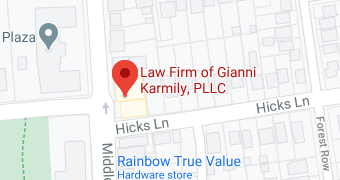In New York, identity theft can be a felony or misdemeanor. Identity theft is a serious crime that can have serious legal consequences, so it’s important to know what exactly constitutes identity theft in the state of New York, as well as what the penalties are. Below, criminal defense attorney Gianni Karmily explains New York’s identity theft laws.
If you or someone you know is facing allegations of identity theft in New York, contact Nassau County, Long Island, identity theft defense attorney Gianni Karmily today. Don’t wait to protect your future–If you’ve been accused of identity theft or hacking crimes in New York, call or fill out the online form to schedule an initial case evaluation. You can reach the Great Neck office at (516) 630-3405 or the Hempstead office at (516) 614-4228.
What is Identity Theft?
Identity theft is a form of fraud where someone wrongfully obtains and uses another person’s personal identifying information, such as their name, Social Security number, debit card or credit card information, bank account information, or any other personal identification number associated with personal or online accounts without their permission. Those who commit identity theft often steal another person’s personal identifying information for fraudulent use or the intent to defraud in order to obtain goods by writing a bad check, opening new lines of credit, or even committing crimes under the victim’s name.
Is Identity Theft a Felony or Misdemeanor in New York?
Identity theft can be either a felony offense in New York or a misdemeanor offense in New York, depending on the circumstances surrounding the alleged crime. Someone can be charged with felony identity theft if the person:
- Obtains goods, products, or services with an aggregate value that is more than five hundred dollars
- Uses credit card information to obtain goods, products, or services with an aggregate value that is more than five hundred dollars.
- Causes financial losses to another person for an aggregate value that is more than five hundred dollars.
- Commit or attempt to commit a felony using another’s personal identifying information
Under New York law, repeat offenders of using personal identifying information or other forms of ID theft can also be charged with felony identity theft if they’ve committed a related crime in the past five years.
In addition to increased jail time, felony convictions can carry a range of additional penalties, like the loss of the right to vote, serve on a jury, or hold public office.
Additionally, if convicted, the process of finding housing and employment becomes much more difficult. These additional consequences can have long-lasting impacts on a person’s life, which is one of the many reasons why it’s important to seek legal counsel whenever facing felony criminal charges. A Nassau County, Long Island theft defense lawyer can help you understand your situation and build a strong defense on your behalf to mitigate the potential repercussions of a felony conviction.
Identity Theft Laws in New York
In New York, ID theft occurs when an individual knowingly and with intent to defraud assumes the identity of another person by presenting themselves as that person, acting as that person, or using that person’s personal identifying information.
Identity theft is divided into four degrees: first-degree, second-degree, third-degree, and aggravated identity theft. The punishments for identity theft vary based on the amount of money allegedly stolen and the circumstances surrounding the alleged crime.
Identity Theft 3rd Degree NY
New York law has third-degree identity theft outlined in Penal Law § 190.78. In New York, someone can be charged with third-degree identity theft if, after assuming someone else’s identity, they:
- Obtain goods, money, property, or services or use credit in the name of the victim; or
- Cause financial loss to such person or to another person or persons; or
- Commit a class A misdemeanor or higher level crime while engaging in identity theft.
Penalties for Third-Degree Identity Theft
In New York, identity theft in the third degree is a class A misdemeanor punishable by up to 1 year in jail.
Identity Theft 2nd Degree NY
New York law outlines second-degree identity theft in Penal Law § 190.79. In New York, a person can commit identity theft in the second degree if, after assuming someone’s identity, they:
- Acquire goods, money, property, or services in the name of such other person totaling more than five hundred dollars;
- Use credit in the name of such other person totaling more than five hundred dollars;
- Cause financial loss to such person or another person totaling more than five hundred dollars;
- Commit or attempt to commit a felony while engaging in identity theft; or
- Commit third-degree identity theft and have been convicted of another identity theft-related crime within the last five years.
Penalties for Second-Degree Identity Theft
In New York, second-degree identity theft is classified as a class E felony, which is punishable by up to 4 years in jail.
Identity Theft 1st Degree NY
First-degree identity theft is outlined in Penal Law § 190.80. In New York, a person can be charged with first-degree identity theft if, after assuming the identity of another person, they:
- Obtain goods, money, property, or services in the name of the victim totaling more than two thousand dollars;
- Use credit in the name of the victim or another person totaling more than two thousand dollars;
- Cause financial loss to the victim or another person totaling more than two thousand dollars;
- Commit or attempt a class D felony or higher while engaging in identity theft; or
- Commit second-degree identity theft and have been convicted of another identity theft-related crime within the last five years.
Identity theft-related crimes include unlawful possession of personal identification information, unlawful possession of a skimmer device, and grand larceny.
Penalties for First-Degree Identity Theft
First-degree identity theft in New York is classified as a class D felony. It is punishable by up to 7 years in jail.
Aggravated Identity Theft
New York outlines aggravated identity theft in Penal Law § 190.80-a. In New York, someone can be charged with aggravated identity theft if, while knowingly assuming the identity of someone in the U.S. military who is serving overseas, they:
- Obtain goods, money, property, or services in the name of the service member totaling more than five hundred dollars;
- Use credit in the name of the service member totaling more than five hundred dollars; or
- Caused financial loss to the service member totaling more than five hundred dollars.
Penalties for Aggravated Identity Theft
Just like first-degree identity theft, aggravated identity theft in New York is classified as a class D felony. It is also punishable by up to 7 years in jail.
Federal Law for Identity Theft
United States federal law also outlaws acts of identity theft. Under 18 U.S.C. § 1028A, a person commits aggravated identity theft if they knowingly transfer, possess, or use another person’s identifying information to commit certain felony crimes. They may face additional penalties if they were using another person’s identity to commit an act of terrorism.
What is the Statute of Limitations on Identity Theft?
The statute of limitations on identity theft in New York depends on the severity of the crime. First-degree, second-degree, and aggravated identity theft have a statute of limitations of 5 years. Third-degree identity theft has a statute of limitations of 2 years.
Nassau County, Long Island Identity Theft Lawyer
If you’re facing identity theft charges in Nassau County, Long Island, you need a trusted criminal defense attorney who can help defend you against these serious allegations. Gianni Karmily understands the gravity of identity theft charges and wants to help ensure you receive the best possible outcome in your case.
Trusted identity theft defense attorney Gianni Karmily often handles felony and misdemeanor cases in Nassau County, Long Island, and can offer you the criminal defense you need to fight these serious charges. He will work tirelessly to investigate the circumstances surrounding the allegations, identify any weaknesses in the prosecution’s case, and craft a strategic defense tailored to your specific needs.
Call the Great Neck office at (516) 630-3405 or the Hempstead office at (516) 614-4228 and schedule a case consultation with attorney Karmily regarding your case.








